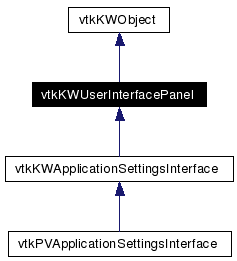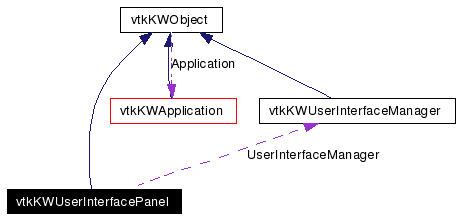vtkKWUserInterfacePanel Class Reference
a user interface panel.
More...
#include <vtkKWUserInterfacePanel.h>
Inheritance diagram for vtkKWUserInterfacePanel:
 [legend]Collaboration diagram for vtkKWUserInterfacePanel:
[legend]Collaboration diagram for vtkKWUserInterfacePanel: [legend]List of all members.
[legend]List of all members.
Detailed Description
a user interface panel.
This class is used to abstract the way an interface "panel" can be subdivided into "pages" (i.e. "sections"). It allows specific GUI parts of an application to be encapsulated inside independent panels. Panels are then associated to a user interface manager (see vtkKWUserInterfaceManager) which is responsible for grouping them inside a widget and handling user interaction so that panels and their pages can be selected in more or less fancy ways. If the user interface manager uses a notebook under the hood, then this class is likely to receive a notebook's page when it will request for a page from the manager. If the manager chooses for a flat GUI, then this class is likely to receive a simple frame that will be stacked by the manager on top of other pages. This class is not a widget, it can not be mapped, the manager is the place where a concrete widget is set and used as the root of all panels (see vtkKWUserInterfaceManagerNotebook for example). What you need to do is to set the UserInterfaceManager's Ivar to a manager, and the rest should be taken care of (i.e. the panel is automatically added to the manager, and if the panel is not created the first time one if its pages is shown or raised, the panel's Create() method is automatically called by the manager, allowing the creation of the panel to be delayed until it is really needed). You should not use the manager's API to add the panel, add or raise pages, etc, just use this panel's API and calls will be propagated to the right manager with the proper arguments).
- See also:
- vtkKWUserInterfaceManager vtkKWUserInterfaceManagerNotebook
Definition at line 53 of file vtkKWUserInterfacePanel.h.
Constructor & Destructor Documentation
| vtkKWUserInterfacePanel::vtkKWUserInterfacePanel |
( |
|
) |
[protected] |
|
Member Function Documentation
| void vtkKWUserInterfacePanel::PrintSelf |
( |
ostream & |
os, |
|
|
vtkIndent |
indent |
|
) |
|
|
|
|
Set the user interface manager. This automatically adds the panel to the manager. If you want to remove this panel from the manager, set the manager to NULL (it is done automatically by the destructor). Note that ownership is transferred to the manager by incrementing (and decrementing later on) the ref count of the panel in vtkKWUserInterfaceManager's AddPanel and RemovePanel methods. |
|
|
Set the user interface manager. This automatically adds the panel to the manager. If you want to remove this panel from the manager, set the manager to NULL (it is done automatically by the destructor). Note that ownership is transferred to the manager by incrementing (and decrementing later on) the ref count of the panel in vtkKWUserInterfaceManager's AddPanel and RemovePanel methods. |
| virtual char* vtkKWUserInterfacePanel::GetName |
( |
|
) |
[virtual] |
|
|
|
Set the panel name. Can be used to add the panel to a menu, etc. |
| virtual void vtkKWUserInterfacePanel::SetName |
( |
const char * |
|
) |
[virtual] |
|
|
|
Set the panel name. Can be used to add the panel to a menu, etc. |
| virtual void vtkKWUserInterfacePanel::Create |
( |
vtkKWApplication * |
app |
) |
[virtual] |
|
| virtual int vtkKWUserInterfacePanel::IsCreated |
( |
|
) |
[virtual] |
|
|
|
Create the interface objects. Note that if the panel is not created the first time one if its pages is shown or raised, this method is automatically called by the manager, allowing the creation of the panel to be delayed until it is really needed. In the same way, if the user interface manager has not been created at this point, it is automatically created now (see vtkKWUserInterfaceManager::Create()). |
| virtual void vtkKWUserInterfacePanel::SetEnabled |
( |
int |
|
) |
[virtual] |
|
|
|
Enable/Disable this panel. This should propagate SetEnabled() calls to the internal widgets. |
| virtual void vtkKWUserInterfacePanel::EnabledOn |
( |
|
) |
[virtual] |
|
|
|
Enable/Disable this panel. This should propagate SetEnabled() calls to the internal widgets. |
| virtual void vtkKWUserInterfacePanel::EnabledOff |
( |
|
) |
[virtual] |
|
|
|
Enable/Disable this panel. This should propagate SetEnabled() calls to the internal widgets. |
| virtual int vtkKWUserInterfacePanel::GetEnabled |
( |
|
) |
[virtual] |
|
|
|
Enable/Disable this panel. This should propagate SetEnabled() calls to the internal widgets. |
| virtual int vtkKWUserInterfacePanel::AddPage |
( |
const char * |
title, |
|
|
const char * |
balloon = 0, |
|
|
vtkKWIcon * |
icon = 0 |
|
) |
[virtual] |
|
|
|
Add a page to the panel (this will, in turn, instructs the manager to reserve a page for this given panel). balloon specifies the balloon help for that page, icon is an optional icon in case it is supported by the manager later on. Return a unique positive ID, or < 0 on error. |
| virtual vtkKWWidget* vtkKWUserInterfacePanel::GetPageWidget |
( |
int |
id |
) |
[virtual] |
|
|
|
Retrieve the widget corresponding to a given page added to the panel. This can be done through the unique page ID, or using the page title. The user UI components should be inserted into this widget. Return NULL on error. |
| virtual vtkKWWidget* vtkKWUserInterfacePanel::GetPageWidget |
( |
const char * |
title |
) |
[virtual] |
|
|
|
Retrieve the widget corresponding to a given page added to the panel. This can be done through the unique page ID, or using the page title. The user UI components should be inserted into this widget. Return NULL on error. |
| virtual vtkKWWidget* vtkKWUserInterfacePanel::GetPagesParentWidget |
( |
|
) |
[virtual] |
|
|
|
Retrieve the parent widget of the pages associated to the panel. It is the unique widget that is common to all pages in the chain of parents. |
| virtual void vtkKWUserInterfacePanel::RaisePage |
( |
int |
id |
) |
[virtual] |
|
|
|
Raise a page added to the panel. This can be done through the unique page ID, or using the page title. Note that if the panel has not been created at this point, the manager will call the panel's Create() method automatically, allowing the creation of the panel to be delayed until it is really needed. |
| virtual void vtkKWUserInterfacePanel::RaisePage |
( |
const char * |
title |
) |
[virtual] |
|
|
|
Raise a page added to the panel. This can be done through the unique page ID, or using the page title. Note that if the panel has not been created at this point, the manager will call the panel's Create() method automatically, allowing the creation of the panel to be delayed until it is really needed. |
| virtual int vtkKWUserInterfacePanel::Show |
( |
|
) |
[virtual] |
|
|
|
Show a panel. It will make sure the pages added to this panel are shown. Note that if the panel has not been created at this point, the manager will call the panel's Create() method automatically, allowing the creation of the panel to be delayed until it is really needed. Raise() behaves like Show(), but it will also instruct the manager to bring up the first page of the panel to the front. IsVisible() will check if the pages of this panel are visible/shown. Return 1 on success, 0 on error. |
| virtual int vtkKWUserInterfacePanel::Raise |
( |
|
) |
[virtual] |
|
|
|
Show a panel. It will make sure the pages added to this panel are shown. Note that if the panel has not been created at this point, the manager will call the panel's Create() method automatically, allowing the creation of the panel to be delayed until it is really needed. Raise() behaves like Show(), but it will also instruct the manager to bring up the first page of the panel to the front. IsVisible() will check if the pages of this panel are visible/shown. Return 1 on success, 0 on error. |
| virtual int vtkKWUserInterfacePanel::IsVisible |
( |
|
) |
[virtual] |
|
|
|
Show a panel. It will make sure the pages added to this panel are shown. Note that if the panel has not been created at this point, the manager will call the panel's Create() method automatically, allowing the creation of the panel to be delayed until it is really needed. Raise() behaves like Show(), but it will also instruct the manager to bring up the first page of the panel to the front. IsVisible() will check if the pages of this panel are visible/shown. Return 1 on success, 0 on error. |
| virtual void vtkKWUserInterfacePanel::Update |
( |
|
) |
[virtual] |
|
| virtual void vtkKWUserInterfacePanel::UpdateEnableState |
( |
|
) |
[inline, virtual] |
|
|
|
Update the "enable" state of the object and its internal parts. Depending on different Ivars (this->Enabled, the application's Limited Edition Mode, etc.), the "enable" state of the object is updated and propagated to its internal parts/subwidgets. This will, for example, enable/disable parts of the widget UI, enable/disable the visibility of 3D widgets, etc.
Reimplemented in vtkKWApplicationSettingsInterface, and vtkPVApplicationSettingsInterface.
Definition at line 154 of file vtkKWUserInterfacePanel.h. |
Member Data Documentation
The documentation for this class was generated from the following file:
Generated on Tue May 30 12:46:24 2006 for ParaView by
 1.3.5
1.3.5



 1.3.5
1.3.5